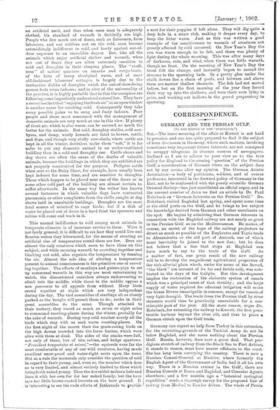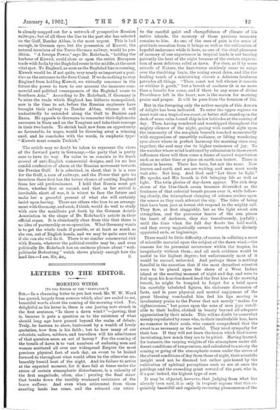CORRESPONDENCE.
GERMANY AND THE PERSIAN GULF.
[To THE EDITOR OF TUB 'SPECTATOR.'] SIP,—The inner meaning of the affair at Kuweit is not hard to perceive, and one was quite prepared to find it the subject
of keen discussion in Germany, where such matters, involving sometimes very important future interests, are not consigned to scrappy telegrams in obscure corners of newspapers.
Inclined as I am to adhere to your view as to the true policy for England in the coming "question" of the Persian Gulf, a consideration of German views on the subject. does not by any means alter my opinion. The German Asiatic Association—a body of politicians, soldiers, and of course professors, interested in the forward policy of Germany in the East, not to be confounded with the purely scientific German Oriental Society—has just established an official organ, and in the current number of Asieh we find an article by. Dr. Paul Rohrbach on " German Interests on the Persian Gulf." Dr. Rohrbach visited Baghdad last spring, and spent some time at the chief ports on the Gulf, and he brings to his subject the knowledge derived from German and other merchants on the spot. He begins by admitting that German interests in connection with the Baghdad railway are not nearly so great in the Persian Gulf as on the Mediterranean. He makes, of course, no secret of the hope of the railway projectors to divert as much as possible of the Euphrates and Tigris trade to Alexandretta or the old port of Antioch, one of which must inevitably be joined to the new line; but he does not believe that a line that stops at Baghdad can have much to say to the trade of the Gulf. As a matter of fact, one great result of the new railway will be to develop the magnificent agricultural properties of the rich alluvial plain which, under the name of the Sawed, " the black " (on account of its fat and fertile soil), was cele- brated in the days of the Caliphs. But this development implies the restoration of the elaborate system of canals which was a principal cause of that fertility ; and the large supply of water required for effectual irrigation will make the Great Rivers Unnavigable in summer, except for vessels of very light draught. The trade from the Persian Gulf by river steamers would thus be practically unavailable for a con- siderable part of the year. All the more reason, urges Dr. Rohrbach, for extending the railway to Kuweit, the first prac- ticable harbour beyond the river silt, and thus to place a German clutch upon the Gulf trade.
Germany can expect no help from Turkey in this extension, for the recruiting-grounds of the Turkish Army do not lie below Baghdad, and she cares nothing about the Persian Gulf. Russia, however, does care a great deal. That pro- digious stretch of railway from the Black Sea to Port Arthur, it stands to reason, must have nearer offshoots to the coast. She has long been surveying the country. There is now a Ruisian Consul-General at Bushire, where formerly tie English Agent of the Government of India' had it all his own way. There is a Russian cruiser in the Gulf ; there are Russian Consuls at Basra and Baghdad, and Consular Agents elsewhere; and a few months ago a " botaaioal zoological expedition" made a thorough survey for the proposed line of railway from Meshed' to Bandar Abbas. The whole of Persia is already mapped out for a network of prospective Russian railways ; but of all these the line to the port she has selected on the Gulf, Bandar Abbas, is the most urgent. This is bad enough, in German eyes, but the possession of Kuweit, the natural terminus of the Turco-German railway, would be per- dition. "A foreign Power," says Dr. Rohrbach, "holding the harbour of Kuweit, could close or open the entire European trade with India by the Baghdad route in the middle, atthe most vital spot. To England, as soon as the Baghdad line is running, Kuweit would be, if not quite, very nearly as important a posi- tion as the entrance to the Suez Canal. If we do nothing to stop England from holding Kuweit, we virtually renounce in the future the power to turn to our account the immense com- mercial and political consequences of the Baghdad route to Southern Asia." According to Dr. Rohrbach, if Germany is to seize the trade which England has hitherto monopolised, now is the time to act, before the Russian engineers have brought their railway to Bandar Abbas, whence it will undoubtedly be extended along the Gulf to Bushire and Basra. He appeals to Germans to remember their diplomatic successes in Siam and on the Yangtsze and take their courage in their two bands. To shrink back now from an opportunity so favourable, he urges, would be throwing away a winning card, and he concludes with the words, in emphatic type : " Kuweit must remain Turkish."
The article may no doubt be taken to represent the views of the forward party in Germany,—the party that is pretty sure to have its way. Its value to us consists in its frank avowal of anti-English commercial designs, and its no less candid confession of alarm at the Russian movement towards the Persian Gulf. It is admitted, in short, that it is a race for the Gulf, a race of railways, and the Power that gets its terminus there first has the better chance of ousting England from her old predominance. I hold that Russia must get there, whether first or second, and that as her arrival is inevitable, short of war, it is wisest to face the future and make her a graceful present of what she will certainly insist upon having. There are others who lean to an arrange- ment with Germany, and such, I think, would do well to study with care the manifesto put forth by the German Asiatic Association in the shape of Dr. Rohrbach's article in their official organ. It is abundantly clear from this that there is no idea of partnership or co-operation. What Germany wants is to get the whole trade if possible, or at least as much as she can, out of English hands, and we may be quite sure that if she can she will do it. There is no similar commercial risk with Russia, whatever the political results may be; and even politically Dr. Rohrbach has an ominous phrase about " welt- politische Bedeutung " which shows plainly enough how the







































 Previous page
Previous page